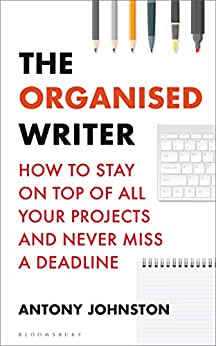Our Founder Jacqui Lofthouse is delighted to interview Antony Johnston, author of The Organised Writer, published by Bloomsbury, 1st October. As one who’s fairly obsessed about productivity for writers herself, she was intrigued to find out more about Antony’s viewpoint.
1. What led you to write ‘The Organised Writer’?
My own life and career, first and foremost. When I became a full-time writer I assumed I could just bash out words, send an invoice every now and then, and never have to worry about anything else. How wrong could I have been?
After a few years I was drowning in unfiled paperwork, lost notes, and — the cardinal sin, to my mind — missed deadlines. I knew I had to get myself organised, and it wasn’t an easy journey. That’s what led me to start writing about productivity in the context of being an author, and eventually expanding it all into a book.
2. Tell me about your own writing life – I’d love to hear a little about the type of projects that you typically work on or are currently juggling?
My career has been one of accumulation, in a way — I started out writing magazine articles, moved onto fiction and web comics, then broke into graphic novels before also writing videogames, becoming a regular public speaker, getting into podcasting, and most recently focusing on screenplays and thriller novels. The thing is that whenever I pick up a new strand, I rarely leave the old ones behind!
So, what am I juggling right now? I recently completed the rough draft of a novel, and just this week outlined another. Last month I finished almost two years of working on a big videogame script, and I’m in talks to start on a new game. I have a screenplay doing the rounds in Hollywood, and I’m working with several producers to pitch other screen projects; a couple of movies, a TV show, an animated series. Earlier this year I wrote and directed a short film, and I continue to host and produce two podcasts. Then there’s my work with the Writers’ Guild and the Crime Writers’ Association, both of which I serve as a committee member.

3. Were you always organised?
I was, until I wasn’t, and then I was again! I spent ten years in graphic design, where I was very organised and on top of everything. But as I mentioned, when I became a full-time writer I thought I could leave all that behind, and so became very dis-organised. Realising that was a mistake is what led me to devise the Organised Writer system.
4. There’s a lot of material about productivity out there. How much have you utilised systems you’ve learned from others and how much have you invented systems to suit your own needs?
Learning from other systems, most notably David Allen’s Getting Things Done, is how I started. And there’s some great stuff in GTD, but one of the most valuable things it taught me is that traditional productivity systems don’t work for a writer, or in fact any creative worker.
So I returned to first principles, and challenged myself not to just tweak an existing solution, but to answer more fundamental questions of what I was trying to achieve, and what I as a writer needed from a productivity system.
5. Is this a book only for professional full time writers?
Not at all. That’s my perspective, of course, and it’s how I use the system myself. But it’s ‘modular’, to use a geeky phrase, so you can take different parts and slot them into your existing work practices.
All improvement requires making changes, but if you’re, say, a parent with young children, of course I understand that you can’t spare four hours every day to write. But using The Organised Writer’s principles ensures whatever time you can spare is spent focusing on writing, not worrying about everything else going on in your life.
6. What kind of difference might your systems make in the typical writer’s life? Can you give an example or two?
Two of the biggest problems busy writers face are scheduling and distraction.
Scheduling in the Organised Writer system is about planning ahead while remaining flexible. It helps you create ‘breathing room’ to deal with obstacles and unexpected problems while still hitting deadlines.
Distraction, meanwhile, is a problem in all walks of life but particularly so for writers. We rely on using our imagination to conjure words — but words are also what we use to remember tasks we have to carry out, and things we need to remember, that have nothing to do with writing. When these things clash in our minds, both sides lose. Part of the system is about helping you ‘offload’ non-writing things from your mind so you don’t have to worry about them while you’re working.
7. Tell me more about the concept of ‘clean mind’?
‘Clean mind theory’ is my term for what happens when we can clear our mind of all the non-writing tasks we have to do, enabling us to focus on writing and using our imagination to its fullest.
Sitting down to write with half a dozen tasks preying on our mind — things we need to remember, chores we need to carry out, and so on — is a huge distraction. One of the biggest benefits I myself get from the system is knowing I don’t have to worry about all that stuff when I’m writing. It’s liberating.
8. You write about ‘job sheets’ for projects – what are these and are they useful for writers at all stages of their careers?
I first came across job sheets working as a designer, and since bringing them back into my life as a writer they’ve been a godsend. They’re simply a printed form which you use to keep track of a project’s status; ticking off stages like research, notes, rough draft, revisions, and so on. They enable you to see at a glance exactly what stage all of your projects are at.
They’re useful no matter where you are in your career because it’s never too early to develop a good habit. Veteran writers juggling multiple projects will find them immediately valuable, of course. But even if you’re a beginning writer with only one or two projects, learning to use job sheets now will pay off later as you take on more work.
9. What suggestions do you have for writers who are reading this whilst sitting in an office surrounded by piles of unfiled papers and chaos, wondering how on earth they would begin to become organised?
Take heart, because I was once like you! As I say in The Organised Writer itself: read the book, take a weekend to sort out your workspace, then get back to work and follow the system.
I know that might sound easier said than done. But if you’re prepared to make the effort, and committed to getting organised, within weeks it’ll become second nature.
10. Does being organised affect the quality of the art in your view? For example, let’s imagine Francis Bacon’s painting studio – a supreme mess, yet still the working environment of a genius…
But was that mess inspirational to him? Or was it simply a byproduct of his lifestyle?
In a way this is an impossible question to answer, because we can’t make a direct comparison. I can say without a doubt that I’ve done my best work since using the system. But I acknowledge that I can’t know whether that might have still been the case even if I was disorganised.
What I do know, again without a doubt, is that since using the system I’ve done more work than I otherwise would have… while conversely being much less stressed.
11. Your book also covers aspects of productivity. If you could share one piece of advice here relating to the act of writing itself – what would that be?
‘It’s easier to revise anything, even the worst writing in the world, than it is to write it in the first place.’
That’s a mantra I’ve both preached and practised for years. Again, it might sound easier said than done, but it’s absolutely true. So when in doubt, just write — because you can always come back and revise it later.
12. How can your book help writers who are working on multiple projects?
That’s the core of the first part of the book. Scheduling, task management, memory offloading, job sheets… it’s a holistic way to help you stay on top of your workload.
If you’re in control of your schedule, you know what to work on next; if you have an overview of every project’s status, you know what you need to do next; and if you’re not distracted by chores and tasks, the work you do will be better and allow you to finish each project sooner.
13. You write about organising money as a writer. What about those who are not yet making money from their writing – could your book help that move towards becoming professional?
Yes, absolutely. Talent may be the most important factor in a writing career, but hitting deadlines is a very close second. Whether it’s fiction or non-fiction, editors love knowing they can rely on a writer.
But besides that, getting a grip on your finances is another good habit worth developing as soon as you can. Start keeping accurate records now so that when you take on more work, and find yourself sending and chasing multiple invoices (and bills!) every month, those good habits will already be in place to help you stay on top of things.
14. What differences have you seen in the writing lives of others who have used your systems to date?
Mainly an increase in productivity and a decrease in stress. One novelist friend didn’t need help with her writing per se, but she took the calendar and scheduling system and adopted it completely to help her stay on track. Conversely, a comics writer friend was already good at juggling projects, but took clean mind theory to heart to help him write more every day.
The Organised Writer is a system that rewards good behaviour with the ultimate writer’s high — knowing you’ve done enough for the day, and can now relax. Every writer knows there’s no better feeling than that.
Thanks so much Antony – I really appreciate the time you’ve taken to explain your system and it’s been an absolute pleasure to read your fascinating book! I know many of my clients and blog readers will benefit from your ideas.
Readers of The Writing Coach blog can buy the book at a discount from Bloomsbury using the code ORGANISEDWRITER20, here: www.bloomsbury.com/theorganisedwriter (codes expires on 30th November)


 The Silence of the Archives – A guest post by Pete Langman
The Silence of the Archives – A guest post by Pete Langman
Leave a Reply